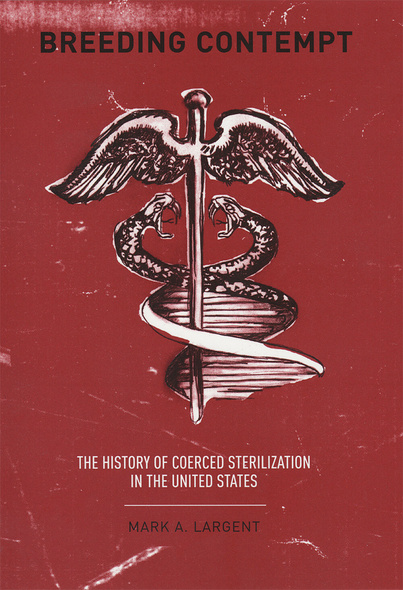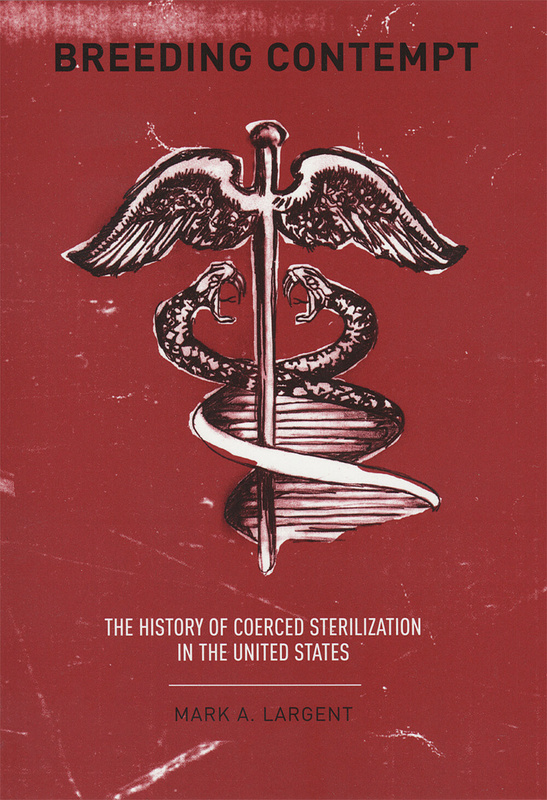Breeding Contempt
The History of Coerced Sterilization in the United States
Most closely associated with the Nazis and World War II atrocities, eugenics is sometimes described as a government-orchestrated breeding program, other times as a pseudo-science, and often as the first step leading to genocide. Less frequently it is recognized as a movement having links to theUnited States. But eugenics does have a history in this country, and Mark A. Largent tells that story by exploring one of its most disturbing aspects, the compulsory sterilization of more than 64,000 Americans.
The book begins in the mid-nineteenth century, when American medical doctors began advocating the sterilization of citizens they deemed degenerate. By the turn of the twentieth century, physicians, biologists, and social scientists championed the cause, and lawmakers in two-thirds of the United States enacted laws that required the sterilization of various criminals, mental health patients, epileptics, and syphilitics. The movement lasted well into the latter half of the century, and Largent shows how even today the sentiments that motivated coerced sterilization persist as certain public figures advocate compulsory birth control—such as progesterone shots for male criminals or female welfare recipients—based on the same assumptions and motivations that had brought about thousands of coerced sterilizations decades ago.
A deeply researched and richly nuanced account of the methods and motives that shaped this dark chapter in American history—and that continue to haunt contemporary debates.
Mark Largent's account of more than a century of involvement of leading Americans in coerced sterilization movements is disturbing and provocative.
The history of eugenics has enjoyed increasing scholarly attention over the past ten years. Mark A. Largent's book contributes to this rejuvenated literature with a narrative that skillfully follows the history of coerced sterilization in the United States from its origins in the mid-nineteenth century to the present. Largent's history reveals how campaigns in favor of sterilization extended well beyond the rise and fall of the mainstream eugenics movement.
An important and thoughtful book that pushes scholars to view the relationship between eugenics and coercive sterilization more carefully and to reconsider the impact that American professionals other than biologists had on popular ideas about and social policy governing reproductive fitness.
A well-researched, thoughtful and accessible history of forced sterilization in the USA. Breeding Contempt has much to commend it. The breadth of research and its clear writing make it an essential contribution to the history of science in the USA. Its slim size and accessible arguments make it especially useful for undergraduates, and its careful attention to the complexity of sterilization—involving medicine, biology, and the coercive power of the state—raises many important and difficult questions about this largely unknown aspect of American history.
Breeding Contempt is a useful contribution to a growing scholarly literature
on eugenics and sterilization in the U.S.
Largent gives the fullest account to date of the tens of thousands of sterilizations performed in the United States, and in disentangling this history from the maligned eugenics movement, he reveals the varying motivations behind the practice over the last 150 years.
A deeply researched and richly nuanced account of the methods and motives that shaped this dark chapter in American history—and that continue to haunt contemporary debates.
Mark Largent's account of more than a century of involvement of leading Americans in coerced sterilization movements is disturbing and provocative.
The history of eugenics has enjoyed increasing scholarly attention over the past ten years. Mark A. Largent's book contributes to this rejuvenated literature with a narrative that skillfully follows the history of coerced sterilization in the United States from its origins in the mid-nineteenth century to the present. Largent's history reveals how campaigns in favor of sterilization extended well beyond the rise and fall of the mainstream eugenics movement.
An important and thoughtful book that pushes scholars to view the relationship between eugenics and coercive sterilization more carefully and to reconsider the impact that American professionals other than biologists had on popular ideas about and social policy governing reproductive fitness.
A well-researched, thoughtful and accessible history of forced sterilization in the USA. Breeding Contempt has much to commend it. The breadth of research and its clear writing make it an essential contribution to the history of science in the USA. Its slim size and accessible arguments make it especially useful for undergraduates, and its careful attention to the complexity of sterilization—involving medicine, biology, and the coercive power of the state—raises many important and difficult questions about this largely unknown aspect of American history.
Breeding Contempt is a useful contribution to a growing scholarly literature
on eugenics and sterilization in the U.S.
Largent gives the fullest account to date of the tens of thousands of sterilizations performed in the United States, and in disentangling this history from the maligned eugenics movement, he reveals the varying motivations behind the practice over the last 150 years.
Introduction: In the Name of Progress
1. Nipping the Problem in the Bud
2. Eugenics and the Professionalization of American Biology
3. The Legislative Solution
4. Buck v. Bell and the First Organized Resistance to Coerced Sterilization
5. The Professions Retreat
Conclusion: The New Coerced Sterilization Movement
Appendix. Bibliography of Twentieth-Century American Biology Textbooks
Notes
Bibliography
Index





